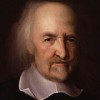The tendency of the casual mind is to pick out or stumble upon a sample which supports or defies its prejudices, and then to make it the representative of a whole class.
Walter Lippmann (1889-1974) American journalist and author
Public Opinion, ch. 10 “The Detection of Stereotypes,” sec. 9 (1922)
(Source)
Quotations about:
extrapolation
Note not all quotations have been tagged, so Search may find additional quotes on this topic.
And whereas sense and memory are but knowledge of fact, which is a thing past and irrevocable, science is the knowledge of consequences, and dependence of one fact upon another; by which, out of that we can presently do, we know how to do something else when we will, or the like, another time: because when we see how anything comes about, upon what causes, and by what manner; when the like causes come into our power, we see how to make it produce the like effects.
Power-worship blurs political judgment because it leads almost unavoidably to the belief that present trends will continue. Whoever is winning at the moment will always seem invincible.
The best Qualification of a Prophet is to have a good Memory.
George Savile, Marquis of Halifax (1633-1695) English politician and essayist
“Experience,” Political, Moral, and Miscellaneous Reflections (1750)
(Source)
There is no surer way to misread any document than to read it literally; in every interpretation we must pass between Scylla and Charybdis; and I certainly do not wish to add to the barrels of ink that have been spent in logging the route. As nearly as we can, we must put ourselves in the place of those who uttered the words, and try to divine how they would have dealt with the unforeseen situation; and, although their words are by far the most decisive evidence of what they would have done, they are by no means final.
Learned Hand (1872-1961) American jurist
Guiseppi v. Walling, 144 F.2d 608, 624 (2d Cir. 1944) [concurring]
(Source)







